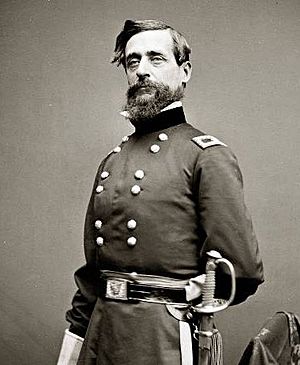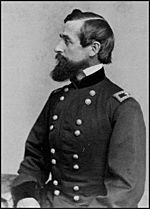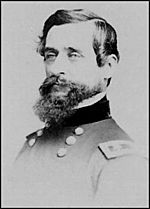Napoleon J.T. Dana facts for kids
Quick facts for kids
Napoléon Jackson Tecumseh Dana
|
|
|---|---|
 |
|
| Born | April 15, 1822 Eastport, Maine |
| Died | July 15, 1905 (aged 83) Portsmouth, New Hampshire |
| Place of burial |
Harmony Grove Cemetery, Portsmouth, New Hampshire
|
| Allegiance | United States of America Union |
| Service/ |
United States Army Union Army |
| Years of service | 1842–1855, 1861–1865, 1894 |
| Rank | |
| Commands held | 3rd Brigade, 2nd Division, II Corps |
| Battles/wars | Mexican–American War |
| Other work | Agent, miner, railroad superintendent, author |
| Signature | |
Napoleon Jackson Tecumseh Dana (born April 15, 1822 – died July 15, 1905) was an officer in the U.S. Army. He was known for his brave service during the Mexican–American War. Later, he became a general in the Union Army during the American Civil War. He was wounded many times while serving in the military. After his army career, he worked with railroads and helped veteran soldiers.
Contents
Early Life and Military Training
Dana was born in Eastport, Maine. His father was also an army officer who had graduated from West Point. Sadly, Dana's father died when he was eleven years old. His grandfathers were also important figures in American history. One was a naval officer in the American Revolution. The other was a member of the Continental Congress and later a U.S. Senator.
In 1838, when he was sixteen, Dana entered the U.S. Military Academy. He graduated four years later in 1842. After graduating, he became a second lieutenant in the 7th U.S. Infantry Regiment. He was stationed in places like Louisiana and Mississippi. In 1845, he was part of the military group that occupied Texas.
Fighting in the Mexican-American War
During the Mexican–American War, Dana and his regiment defended Fort Brown in May 1846. They also fought in the Battle of Monterrey in September. He was promoted to first lieutenant in February 1847. He then took part in the Siege of Veracruz in March.
At the Battle of Cerro Gordo in April, Dana was badly wounded in his hip. He was left on the battlefield for about 36 hours and was thought to be dead. But he was found by a burial team. For his bravery at Cerro Gordo, he was given the honorary rank of brevet captain.
After recovering, Dana worked on recruiting and as an Assistant Quartermaster. He also helped build Fort Ripley in Minnesota. In 1855, he left the army and became a banker in St. Paul, Minnesota. From 1857 to 1861, he served as a brigadier general in the Minnesota State Militia.
Service in the Civil War
In the fall of 1861, Dana joined the Union cause. He became a Colonel of the 1st Minnesota Volunteer Infantry Regiment. He was then given command of a brigade in the Army of the Potomac. His men fought in the Battle of Ball's Bluff in October 1861.
On February 6, 1862, Dana was promoted to brigadier general. He led the 3rd Brigade of the 2nd Division in the Union II Corps. This brigade included soldiers from New York, Massachusetts, and Michigan. Dana led them through the Peninsula Campaign in 1862. They fought in battles like the Siege of Yorktown, the Battle of Seven Pines, and the Battle of Malvern Hill.
After these battles, Dana became ill with a fever. He went to Philadelphia to recover for six weeks. He returned to duty just before the Maryland Campaign.
The Battle of Antietam
Dana bravely led his brigade during the Battle of Antietam on September 17, 1862. This was one of the bloodiest single-day battles in American history. Dana's brigade crossed the Antietam Creek and moved to support the Union line. They marched into an area known as the West Woods.
As they advanced, Dana's brigade came under heavy artillery fire. Soon, Confederate troops attacked their left side. Dana skillfully moved his soldiers to a safer area, even though he was seriously wounded in his left leg. The pain became too much, so he handed command to Colonel Norman Hall. Dana was taken to a field hospital and then to Washington, D.C., and Philadelphia to recover. At Antietam, his command lost about 900 men.
Dana was promoted to major general on November 29, 1862. However, he could not return to duty until the summer of 1863 because of his wound. During the Gettysburg Campaign, he commanded the defenses of Philadelphia.
Later that year, Dana was given command of divisions and then corps in the Department of the Gulf. He led troops in actions like the Battle of Stirling's Plantation. He also commanded the XIII Corps. In the fall of 1864, he moved to the Western Theater and joined the Army of the Tennessee. He commanded the District of Vicksburg and briefly the XVI Corps.
Vicksburg and the Sultana Disaster
Dana returned to command in Vicksburg, Mississippi, until December 1864. He then led the Department of Mississippi until May 1865. During this time, he was in charge of the area where the steamboat Sultana exploded.
The Sultana was carrying recently released Union prisoners of war. It stopped in Vicksburg for boiler repairs. Many more soldiers crowded onto the boat, making it dangerously overloaded. On April 27, 1865, the repaired boilers exploded. Most of the people on board died instantly or were thrown into the cold Mississippi River.
Dana and other officials investigated the disaster. However, no one was ever put on trial for the incident.
After the War
Dana left the U.S. Army on May 27, 1865. He then became a miner and worked for a commercial company in San Francisco. He traveled in California, Alaska, and Washington, D.C.
In 1872, Dana began working with railroads. He was a superintendent for several railroads in Illinois. He also served as a commissioner in charge of railroad pools in St. Louis, Missouri. Later, he became president of the Montana and Union Railway Company.
In 1893, Dana became chief of the Old War and Navy Division. In 1895, President Grover Cleveland promoted him to First Deputy Commissioner of Pensions. However, President William McKinley removed him from this job in 1897.
In 1894, a special act of the United States Congress allowed Dana to be commissioned as a captain in the U.S. Army for a short time. This allowed him to be placed on the retired list and receive a pension. Dana spent his final years in Washington, D.C. He died in Portsmouth, New Hampshire, in 1905, and was buried there.
His experiences in the Mexican War were published in a book called Monterrey is Ours! in 1990.
Images for kids
See also
 In Spanish: Napoleon Jackson Tecumseh Dana para niños
In Spanish: Napoleon Jackson Tecumseh Dana para niños
- List of American Civil War generals (Union)







